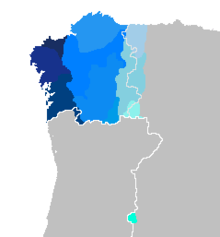Western Ibero-Romance language From Wikipedia, the free encyclopedia
Galician (Galician: Galego) is a modern language that is spoken in Galicia, a region of Spain in the northwest of the Iberian Peninsula. Galician is closely related to Portuguese because they split from the same language, which is now called Galician-Portuguese or Medieval Galician. Some even say that Galician and Portuguese are two dialects of the same language but with different accents. However, most scholars say that the differences are now so great since both languages separated in the Middle Ages that they are now truly different languages. Galician is also very similar to the Leonese language.
| Galician | |
|---|---|
| galego | |
| Pronunciation | [ɡaˈleɣʊ] |
| Region | Galicia and adjacent areas in Asturias and Castile and León |
| Ethnicity | Galician |
Native speakers | 2.4 million (2012)[1] 58% of the population of Galicia (c. 1.56 million) are L1 speakers (2007)[2] |
Early form | |
| Galician alphabet (Latin script) Galician Braille | |
| Official status | |
Official language in | Galicia (Spain) Official regional language. Decades of development as language of literature, including poetry and essays for all levels of education. Growing sense of ethnic identity.[3] |
| Regulated by | Royal Galician Academy |
| Language codes | |
| ISO 639-1 | gl |
| ISO 639-2 | glg |
| ISO 639-3 | glg |
| Glottolog | gali1258 |
| Linguasphere | 51-AAA-ab |
 Distribution of the various dialects of Galician in Spain and the extreme north of Portugal. | |
Galician is a Romance language that evolved from Vulgar Latin, the Latin of common people in the medieval Kingdom of Galicia after the fall of the Western Roman Empire. The area is now Galicia, the western parts of Asturias and Castile-Leon and the Norte region in northern Portugal.
Galician took most of its words from Latin, many from Judeo-Spanish but some from Germanic and Celtic.
Galician comes from Galician-Portuguese, spoken during the Middle Ages in the medieval Kingdom of Galicia. Today, Galician is spoken only in Galicia and by some people in North America, South America and Eastern Europe. In Jalisco, Mexico, Galician still leaves traces in the accent and words.
Some people say Galician and Portuguese are really two dialects of the same language because there are not a lot of differences between them, but they are officially two separate languages. Most scholars say they that have become so different over hundreds of years that they are now two different languages.
People who speak Portuguese in northern Portugal, which is close to Galicia, and people who speak Galician in Galicia, say that they can understand a lot each other, but that is less true in the south of Portugal.
During the Enlightenment, Benito Jeronimo Feijoo already raised that question. He considered Galician and Portuguese the same language originating in Latin, and constituting a linguistic unity, and not dialects of Castilian-Spanish.[4]
Seamless Wikipedia browsing. On steroids.
Every time you click a link to Wikipedia, Wiktionary or Wikiquote in your browser's search results, it will show the modern Wikiwand interface.
Wikiwand extension is a five stars, simple, with minimum permission required to keep your browsing private, safe and transparent.